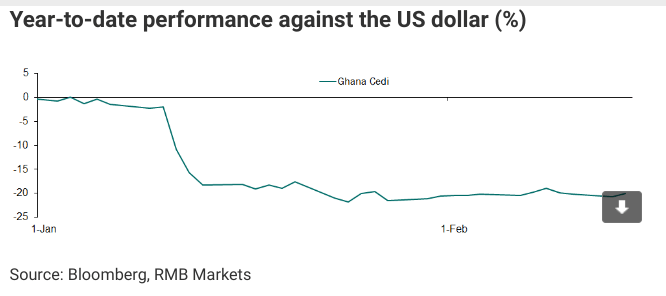Market watchers are optimistic about the cedi’s year-long prospects, with analysts at the research arm of RMB Africa projecting the currency to end 2023 at around GH¢13 to US$1.
If attained, it will represent a significant improvement over the cedi’s performance in 2022 – when it depreciated by 30 percent against the US dollar, according to the Bank of Ghana (BoG), compared with the 4.1 percent dip in 2021.
The cedi’s performance is closely tied to the country’s efforts to secure a US$3billion bailout from the International Monetary Fund (IMF), and recent developments have brought the country closer to this goal. According to analysts, confidence in the local market is expected to rebound later in the year; which could bode well for the local unit.
“We expect confidence in the local market to resume, which could be supportive of the currency later in the year. Our base case is for the cedi to end the year at levels closer to US$/GH¢13.1,” RMB Africa said.
RMB expects the cedi to firm-up in the second half of the year, as it believes that approval from the IMF is likely to be achieved in the second quarter of 2023 – with the first IMF disbursement following soon after – due to the outstanding renegotiation of external debt after suspending interest payments on its Eurobonds.
Already, government has initiated discussions to create an official creditor committee with holders of its external debt, including bilateral lenders, with support from the Paris Club.
In the interim it is anticipated that there will be minor fluctuations due to the pockets of uncertainty, but nothing erratic is expected.
Despite the cedi posting a mixed performance against the major trading currencies and across the market segments last week – unchanged against the US$ from the previous week, gaining 1.2 percent versus the euro and dipping marginally relative to the British pound (GBP) on the interbank reference market.
It however regressed by 1.2 percent versus the US$ on the retail market, but appreciated against the euro and the GBP last week.
This, GCB Capital Limited’s (GCL) research team says, is attributable to suspension of the external debt servicing as well as the muted activity in secondary bonds market amid the prevailing uncertainty.
“We envisage depreciation risks from speculative activity, as the FX market remains highly uncertain and news-sensitive,” it added earlier this week.
Inasmuch as some hurdles remain, analysts are cautiously optimistic about the cedi’s prospects and some are already positioning themselves for a potential recovery in the currency.
On Tuesday, the Finance Ministry announced that its Domestic Debt Exchange Programme (DDEP) had received acceptance from approximately 85 percent of bondholders; an essential step in securing the IMF bailout.
Data from the ministry finance reveals that the educational infrastructure-focused Daakye bonds recorded the highest participation rate, followed by Government of Ghana (GoG) and ESLA bonds.
Of the GH¢1.45billion worth of eligible Daakye bonds, GH¢1.36billion, representing 93.89 percent, were tendered. GoG bonds recorded an 85.19 percent participation as GH¢77.98billion in old bonds were tendered from a stock of GH¢91.53billion. With the ESLA bonds, investors were willing to exchange GH¢3.66billion, or 76.66 percent, from a total of GH¢4.77billion.










